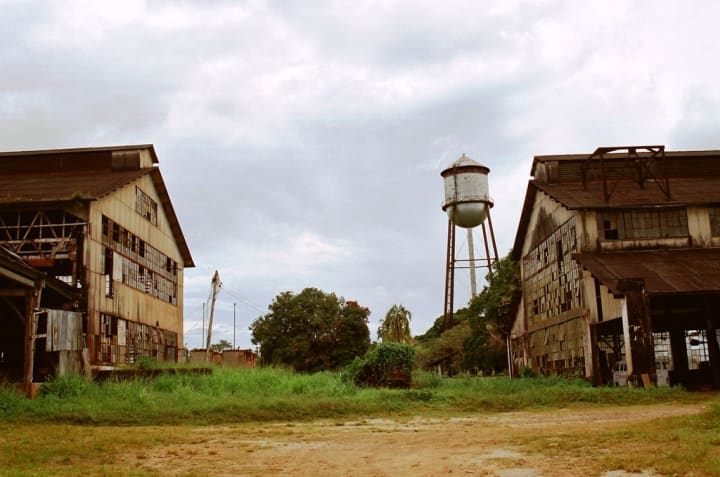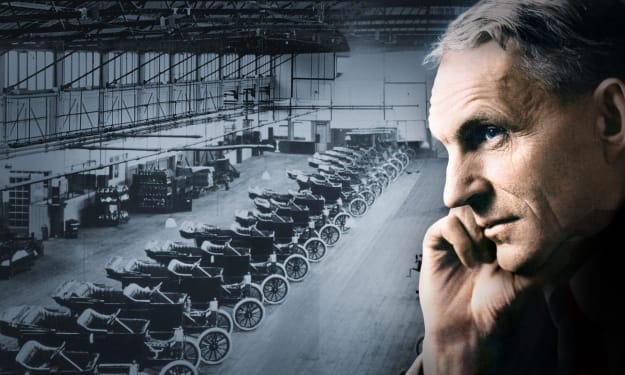10 Facts You Didn't Know About Henry Ford
These are some super cool facts you didn't know about Henry Ford.

Henry Ford is known for launching one of the seminal and most influential automotive companies in America and the world. You likely know of Ford's Model T, his innovation in the development of the assembly line, and, of course, the enduring Ford Motor Company. However, a bit more research will reveal that these exploits are only the tip of the iceberg in the chronicle of Ford's life. Ford has ties to many extraordinary events in history, some positive and others decidedly not. From befriending some of the most brilliant minds the 20th century to influencing one of the most horrible people in human history, it is impossible to ignore Ford's impact on the world (for better or horribly worse). For a man who achieved such financial and industrial success, Ford, as anyone does, had many missteps and misadventures along the way that would come to complicate his legacy. Warts and all (and he has more than a toad), Henry Ford was an important figure in the development of the modern world and a fascinating historical figure. Below are 10 facts you didn't know about Henry Ford.
Ford had some weird spiritual ideas.
As one of the most significant and visionary industrialists of the 20th century, the press and public alike were curious to know about his thought process. The man who brought the first widely marketable cars to the public obviously had a unique mind and process, and people wanted to understand his accomplishments on some level. However, Ford was surprisingly skeptical of himself and his brilliance. According to Ford, his inventions and actions were not truly his own, but one of some "master mind." Ford said this much in a 1928 interview with the Detroit Times, where he explained that he supposed that this "master mind," or "great spirit," was sending him and everyone "brain wave messages." Ford continued in claiming, "I never did anything by my own volition. I was pushed by invisible forces..."
Ford ran for US senate, and almost won.

From Anthony Adragna on Twitter
As World War I was coming to a close, an era of turbulent change was afoot in the United States. While the decade to come would benefit some (albeit a very narrow group), the social changes and financial boom of the coming decade would ultimately collapse and leave a controversial legacy. However, Ford Henry Ford saw fit to take a run at the Senate in 1918 on the Democratic ticket. With the explosive success of his Model T, largely considered the first widely affordable automobile, this move likely made a great deal of sense at the time. While ultimately losing to Republican candidate Truman Newberry, Ford would fall short by a mere 4,500 votes. The above chart shows just how close he came to overtaking his opponent; 48.5 percent of the vote to Truman's 50.2 percent. Based on some of the facts to follow and despite Truman's blunder regarding the world today, it is probably best that Ford was not elected to government.
Ford bought a newspaper, and used it to disseminate hate speech.
Perhaps you have heard that Henry Ford had some antisemitic views and didn't keep them a secret. Later on in the same year he ran for Senate, Ford acquired the Dearborn Independent, a soon to be infamous newspaper that Ford largely controlled the content of. In 1920, the paper published the headline "The International Jew: The World's Problem," with articles that followed blaming the Jewish people for World War I and essentially anything that Ford found wrong with society. Though Ford would issue an apology and shut down the paper in 1927 after weaseling around a defamation suit, much of this toxic content was compiled into an even more aggressively titled book, The International Jew: The World's Foremost Problem. With the book flying off the shelves in Hitler's Nazi Germany, Ford and his hate speech were mentioned and praised by Adolph Hitler, a presumably unknown fact about Adolf Hitler, in the dictator's own diatribe Mein Kampf.
Ford was chummy with Thomas Edison.

Being a titan of industry and innovation for a new age, it should come as little surprise that Ford kept company with other innovators and robber baron types. With the profound success of the Ford Automobile Company, Ford would come to be very friendly with inventor and Edison Illuminating Light Company founder Thomas Edison. Ford rose up through the ranks at the Edison Company, coming aboard in 1891 and ascending to chief engineer within two years. With his earnings, Ford began to chase his passion and began working on a gasoline engine. In fact, Ford and Edison, along with rubber tire magnate Harvey Firestone and others, were known for taking long road trips in a time when the routes of travel were still often very primitive and treacherous. To disabuse one of any notion that these were quaint, adventurous jaunts through the country, it is noted that Ford and his companions were flanked by dozens of additional Ford vehicles to provide maintenance, provisions and film coverage to document and glorify the trips.
The Model T was undependable.
Just as the price for the first affordable automobile was pretty low, so too was the build quality and dependability of the Model T. The oft repeated joke acronym for Ford's name that has been passed down over the years Fix Or Repair Daily was not unearned, as one of the worst Ford vehicles ever made. Though the Model T was a foundational element in the development of the automobile, it was not very reliable by today's standards. Imagine commuting to work or traveling and not only fearing that you will break down, but expecting it. With its inline four-cylinder engine producing a paltry 20 horsepower (scarcely more than a modern tractor mower), supporting as much as 1,600 pounds of metal (more than twice as much as said tractor), it comes as little surprise that the Model T was very slow, weak, and under-powered compared to the vehicles of today. Additionally, many of the components and controls varied greatly from those of the modern automobile. With such little punch, the vehicles even had trouble climbing steep hills.
Ford wanted to make the plane a household item too.

Seeing such massive success in distributing the automobile far and wide, Ford figured he could do the same with the airplane. Since he was not an aeronautical engineer, Ford did something that he was often loath to do; he hired an expert. Ford commissioned engineer Otto Koppen to create a Ford airplane, which he would dub the Ford Flivver. The Flivver would be designed for short takeoffs and have a tail wheel to allow the average joe to theoretically wheel it to the nearest runway. Though the project was an initial success, with the design finished by 1926, a 1928 early test flight from Michigan to Miami resulted in plane's engine seizing over water and crashing violently into the ocean. The body of the test pilot was never recovered. Accordingly, Ford scrapped the project, though he would come to play a role in the development and mass production of military aircraft during the Second World War.
Ford recovered six cents in damages in a lawsuit.
For someone who was known for using his platform to express hateful views and slanderous accusations to the point of being sued for defamation, it is may be rather surprising to find that Ford launched a defamation suit of his own. The Chicago Tribune critically assessed Ford's disapproval of President Wilson's plan to station troops near the border to defeat rebel combatants from Mexico that had attacked towns near the border, calling Ford an "ignorant idealist" and an "anarchist." Ironically, the man who would come to slander an entire religion years later took these comments as personal sleights. Taking the Tribune to court for defamation for an amount of $1 million dollars, Ford won the trial, but was awarded the comical sum of six cents by the jury, and the scorn of the media across the nation.
Ford created a company town named Fordlandia.

This is the biggest corporate blunder that you've never heard of! At a time when tires and other rubber products were constructed of natural tree rubber, Ford sought to get his share of the market. In 1928, Ford set up a company town miles from anything else on the banks of a remote river in the Amazon Rain Forest in Brazil. The town, which he dubbed Fordlandia, was a dismal failure in almost every conceivable way, right from the start. With his staunch morals and conceptions of the model employee, Ford tried to impose a normal American 9 to 5 shift work schedule in an environment where the afternoon sun made an already hot environment simply oppressive. To make such matters worse, Ford used prefabricated structures from the United States to build his company town, ignoring the fact that these tin-roofed, heavily insulated structures were fundamentally wrong for such a hot climate. Additionally, he tried to impose American food staples on the native workers and frivolously stupid rules, such as mandatory square dancing. These and other factors led Ford to desert the town in 1934, though he made the puzzling mistake of establishing another one down river known as Belterra. With the development of synthetic rubber in the mid 1940s, Ford's foray into rubber harvesting became utterly pointless. This subject is worth a deep dive, as the story is quite fascinating.
Ford had a disdain for experts.
Considering the complexity and innovation of Ford and his company, the man had a rather counterintuitive dislike for anyone considered to be an expert. Ford made concerted efforts not to hire engineers with high degrees, believing that experts were overrated and cocky (seemingly lacking any sense of irony). One particularly humorous example of this backfiring came when a generator in Ford's factory broke down. When all of his novices failed to resolve the problem, Ford relented and brought in an engineer to solve the issue. When the engineer quickly fixed the machine, he billed Ford for $10,000. When Ford demanded an itemized list of expenses for the repair, the engineer listed $1 for making the repair and $9,999 dollars for knowing how to fix it on the invoice.
Ford essentially spied on his workers.

While Ford was credited with many reforms and innovations in the field of labor and fair wage, he had some very strange conditions for these reforms. Chances are, one of the facts you didn't know about Henry Ford is his creation of the Ford Sociological Department. The euphemistic name belies the true nature and operation of this creepy division of, at best, dubious legality. Ford assembled this team of what he called "investigators" to assure that his workers were exhibiting model behavior. While it is reasonable to expect a certain standard of behavior in the workplace, Ford's "investigators" were charged with the deeply invasive observing of the home lives of his employees and even their families. Any employees that were not up to snuff with Fords strict and often absurdly unreasonable standards received pay cuts and other disciplinary actions, as well as being terminated in some cases.
About the Creator
Fred Eugene Park
Fred Park is a writer, singer and guitarist with a deep passion for music, sports and history. Fred graduated from Purchase College in 2016 with a BA in history.






Comments
There are no comments for this story
Be the first to respond and start the conversation.